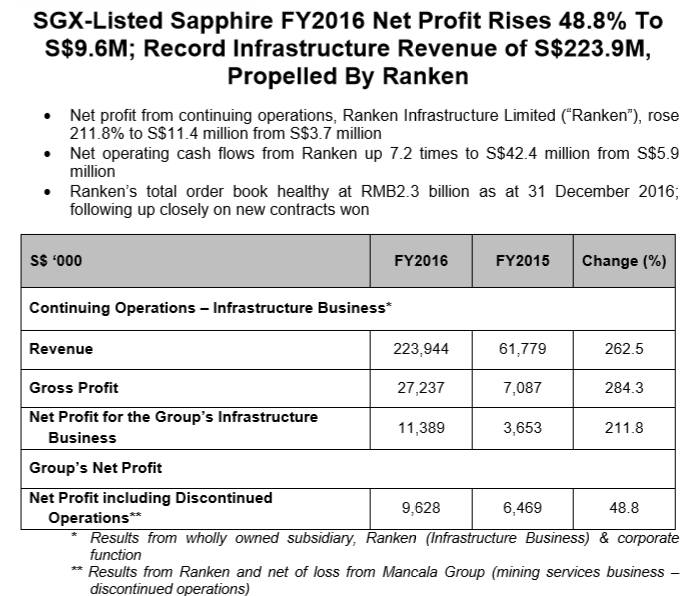
Venue: Sapphire Corp, 123, Genting Lane.
Time & date: 11 am, April 24
AFTER THE AGM yesterday, a small group of investors met up for about one and a half hours with Angeline Lim, the corporate communications manager, and Ng Hoi Gee, Kit, the CFO, to better understand the business of Sapphire Corp.

My 10 key takeaways are:
1. All of Sapphire's business is done in China but its management (from non-executive chairman to CEO to CFO, etc) comprises mainly Singaporeans.
As such, its corporate governance can be expected to be of a high level and its risks, if any, are less likely to be those associated with S-chips.
2. Sapphire’s core business is the manufacture and sale of vanadium pentoxide flakes which are used to produce light-weight, high-tensile steel for use in constructing infrastructure. Sapphire also produces the usual rebars and hot-rolled coils.

3. Vanadium pentoxide goes for around RMB75K a tonne – down from RMB100K a tonne some time back. Looks like a price bottom now and it can only go up with a recovery in steel demand in China. Vanadium pentoxide contributed 41% of revenue in 2011 and enjoyed gross margins of 26%.
4. Hot-rolled coils contributed 32% of revenue (gross margin was minus 4.8% owing to insufficient economies of scale due to a fall in demand); rebar processing contributed 25% (48% gross margin) and mineral trading an insignificant 0.2% of revenue (-7.7% gross margin).
Sapphire’s key operating business is Neijiang Chuanwei Special Steel Co. Ltd – this was 70% owned until Dec 1 last year when Sapphire acquired the remaining 30% to make it 100%-owned.
5. Special Steel made profit after tax for FY 2011 of RMB 90.9 million (S$ 17.8 million) as compared to RMB 91.5 million (S$ 18.5 million) in FY 2010.
6. Sapphire has strong operating cashflow (after accounting for a buildup in inventories last year for its new mineral trading business, etc) and held about S$34 million cash in the bank as at end-2011.
Key to that is the industry practice of customers paying for steel products with cash upfront or, as is more common now, via bills payables guaranteed by the bank.
7. Sapphire’s income statement states a net loss of S$35.6 million --- investors should not be alarmed as this includes non-operating items including an impairment loss on its China VTM stake.

Minus all that, the profit for FY 2011 would have been $4.6 million as compared to $7.0 million (FY2010).
8. The $35.6 million loss is the reason for Sapphire not paying a dividend for FY2011. It couldn’t do so as it had accumulated losses – ie, it didn’t have accumulated earnings to be allowed under accounting rules to pay a dividend. It had paid a dividend of 1 cent a share for FY2010.
9. The effects of the marked-to-market for its stake in China VTM would be gradually nullified from January 2013. The stake was pledged under a financing arrangement with Credit Suisse.
Sapphire will repay Credit Suisse S$91.3 million in nine equal tranches from January 2013 through to January 2015. The repayment would be either in cash or, more likely, shares of China VTM.
10. Sapphire stock traded recently at 16 cents, which is about half its net asset value of 33.18 cents. Sapphire has a share buyback mandate but has never bought back shares. Who knows, it might happen this year if the undervaluation persists or gets deeper.
There was some discussion on Sapphire's due diligence on a new business -- the production of silicon steel, which is a premium product for widespread use in electrical appliances. Let's wait and see if the company will confirm its entry into this business which would contribute from FY13 but offers potentially attractive gross profit margins.
Recent story: You are invited to SAPPHIRE CORP's AGM -- and lunch







